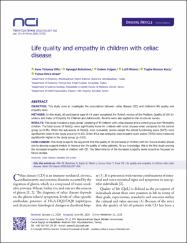Life quality and empathy in children with celiac disease

View/
Access
info:eu-repo/semantics/openAccessDate
2020Author
Tolunay Oflu, AyşeBükülmez, Ayşegül
İçiğen, Erdem
Molon, Lütfi
Gürsoy Koca, Tuğba
Avşar, Yunus Emre
Metadata
Show full item recordAbstract
OBJECTIVE: This study aims to investigate the associations between celiac disease (CD) and children's life quality and empathy level. METHODS: In this study, all participants aged 8-14 years completed the Turkish version of the Pediatric Quality of Life Inventory and Index of Empathy for Children and Adolescents. Parents were also applied to the structured survey. RESULTS: This study included a study group consisting of 45 children with celiac disease and a control group with 48 healthy children. The total scores of PedsQL were significantly lower for children with celiac disease when compared to the control group (p<0.05). When the sub-scores of PedsQL were evaluated, scores except the school functioning score (ScFS) were significantly lower in the study group (p<0.05). When IECA was analyzed, total empathy scale scores (TESS) were measured significantly higher in the study group (p<0.05). CONCLUSION: This study supports the argument that the quality of life decreases in children with CD. Future studies should aim to develop support models to improve the life quality of celiac patients. To our knowledge, this is the first study proving the increased empathy levels of children with CD. The determinants of the increased empathy levels should be focussed on future studies.















